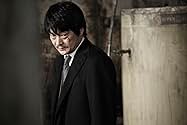When the attempt to kill a professor goes wrong, a series of violent events are triggered which force a taxi driver to run for his life.When the attempt to kill a professor goes wrong, a series of violent events are triggered which force a taxi driver to run for his life.When the attempt to kill a professor goes wrong, a series of violent events are triggered which force a taxi driver to run for his life.
- Awards
- 8 wins & 21 nominations total
Kim Jae-hwa
- Girlfriend of Myeon Jeong Hak
- (uncredited)
Featured reviews
The latest Korean thriller to make the international leap is quite an event. Weighing in at a respectable 140 minutes (still 17 minutes shorter than the Korean version) it is filled to the brim with as much grit as anyone could wish for. I knew from the opening voice-over that I wasn't in for a barrel of laughs. The cold monotone relating the tale of a childhood pet dog that died of rabies set the tone for the uncompromisingly grim two-and-a-bit hours to follow. The story follows Gu-Nam, a taxi-driver struggling to make ends meet in a province between Korea and China. His wife has moved away to earn money but hasn't made contact.. In an impossible hole of debt, he is offered a way out. He has to go to Korea and kill someone there. The gangster (the ruthless and unflappable Myun) offering this once-in-a- lifetime chance will, of course, kill his family if he fails. Not, you might think, a terribly original plot idea but there are a number of qualities which make it rather special. First, the setting; South Korea's major cities provide a wonderfully bleak backdrop to the action and much of this is rather beautifully showcased by director Hong-Jin Na. But more than this, the film gives an insight into aspects of Korean culture never normally seen by the Western world, particularly the discrimination against the region Gu-Nam is from (the name of which I will not attempt to type). However, the film's defining feature must be its sheer, visceral grit. Everything, including our desperate protagonist feels painful and dirty. The bloody fight scenes are utterly devoid of glamour and deliberately so. Sadly however, this also robbed them, for me at least, of much of the charm I normally find in well-choreographed fight scenes. This is a trend continued throughout the film. The story, though fairly linear, is complicated by a plethora of characters and the audience is given little to nothing in the way of tantalising hints to lead us through. Essentially, Na has gone out of his way to produce as brutal and harsh a film as he could and, in the process, sacrificed a great deal of potential enjoyment.
I have nothing against unsteady camera work if this is used for chasing scenes or is taken as a crucial stylistic element (e. g. Black Witch Project). But what the heck ... over the whole movie you feel like sitting in a boat that pitches and yaws up and down on the sea. The camera work mirrors any gestures or motions even in no-action plots. Otherwise, this movie shows great acting and is surely an interesting thriller. I love the Korean no gun fights. Sometimes you have problems to recognize and relate the Korean actors (they looks very similar to me). Thus, the movie encounters difficulties to follow the plot easily. Nevertheless, i strongly recommend this movie - even if you have to watch it twice.
Directed by Hong-jin Na The story of a cab driver in Yanji City, a region between North Korea, China and Russia. His wife goes to Korea to earn money, but he doesn't hear from her since in 6 months. He plays mah-jong to make some extra cash, but this only makes hif life worse; but then he meets a hit-man who proposes to turn his life around by repaying his debt and reuniting with his wife, just for one hit (Plot).
Once again, the filmmakers and actors (the same as The Chaser 2008) from South Korea have hit a huge great film again, nothing bad here, just in one word when the film end you will say wow !, one of the best thrillers i saw in my life, the film combines many things such as crimes, suspense, betrayal, bloody fight, hunts, struggle, patience, pain, sacrifice,car chases and more! I love everything in this film, first the story of the film and how the director tells in three major characters in 4 chapters, secondly linking all the three characters in many scenes and goals (Money!), thirdly the great performance of the three characters especially the(Jung-woo Ha and Yun-seok Kim) and finally directing and Screenplay was remarkable !.
Director Na in his 156-minute film divided into four chapters ( Taxi driver, Killer, Joseon Clan and Yellow Sea) practically wrote about the history of the building of primal instincts, how they get awakened by chance, how they crash with other instincts and the ending to it all.
Had he given more commercial consideration he could have made the running time more compact. The latter half of the film drags on a bit due to the repeated pattern of killings and chase. Therefore dividing the film in chapters to show three people's perspectives from beginning to end is 100 percent director Na's own doing.
5/5
Once again, the filmmakers and actors (the same as The Chaser 2008) from South Korea have hit a huge great film again, nothing bad here, just in one word when the film end you will say wow !, one of the best thrillers i saw in my life, the film combines many things such as crimes, suspense, betrayal, bloody fight, hunts, struggle, patience, pain, sacrifice,car chases and more! I love everything in this film, first the story of the film and how the director tells in three major characters in 4 chapters, secondly linking all the three characters in many scenes and goals (Money!), thirdly the great performance of the three characters especially the(Jung-woo Ha and Yun-seok Kim) and finally directing and Screenplay was remarkable !.
Director Na in his 156-minute film divided into four chapters ( Taxi driver, Killer, Joseon Clan and Yellow Sea) practically wrote about the history of the building of primal instincts, how they get awakened by chance, how they crash with other instincts and the ending to it all.
Had he given more commercial consideration he could have made the running time more compact. The latter half of the film drags on a bit due to the repeated pattern of killings and chase. Therefore dividing the film in chapters to show three people's perspectives from beginning to end is 100 percent director Na's own doing.
5/5
www.eattheblinds.com
I can't remember the last time Hollywood offered me anything mind-blowing. An industry now controlled by bankers for shareholders, even filmmaking geniuses like Martin Scorsese have been reduced to making pointless kids movies. Not even the so-called independent cinema in the US has been spared Hollywood's fixation with the bottom line, where the few table scraps left are thrown to a dwindling numbers of original voices still relevant. If ever we needed another Easy Rider inspired industry revolt, then now is the time.
With American cinema (not unlike the country itself) irrelevant and hopelessly behind the times, the only option North American cinephiles have, is to go abroad. One of the countries that's long since surpassed American cinema for shock and originality is South Korea. And it's not like Hollywood is oblivious, they're actually cannibalizing SK cinema by remaking Korean gems into pointless American knockoffs. The latest SK gem ripe for reproduction is Hong-jin Na's The Yellow Sea (Hwanghae).
Like Ravel's Bolero, The Yellow Sea understands the patient reward of crescendo: starting slow and building to a fevered climax. By the end of this, we're left with what seems impossible for an epic 156 minute film: wanting more. With the exception of one car chase marred by phony green screen cutaways (see the video below), the breakneck action, extreme violence and hyper-realistic gore is virtuosic. Guns noticeably absent, whooshing knives, devastating hatchets and the blunt trauma of gnawed animal bones provide The Yellow Sea with brutal, bloody and refreshingly lo-tech weapons of choice, a grim example of how Hollywood and it's obsession with appeasing demographics can't compete.
But The Yellow Sea is much more than just a knife brandishing ballet that hearkens back to early 90s HK bullet ballets, it's exceptionally well written and acted with none of HK cinema's clichéd melodrama. The characters here are many shades of grey, avoiding archetypal absolutes, allowing us to identify with and like even the worst of the worst. All of the action is beautifully composed with kinetic, hand-held photography that compliments the bleak color palette, which results in a gritty and ultra-realistic film, not unlike so many American masterworks from the 1970s.
I can't remember the last time Hollywood offered me anything mind-blowing. An industry now controlled by bankers for shareholders, even filmmaking geniuses like Martin Scorsese have been reduced to making pointless kids movies. Not even the so-called independent cinema in the US has been spared Hollywood's fixation with the bottom line, where the few table scraps left are thrown to a dwindling numbers of original voices still relevant. If ever we needed another Easy Rider inspired industry revolt, then now is the time.
With American cinema (not unlike the country itself) irrelevant and hopelessly behind the times, the only option North American cinephiles have, is to go abroad. One of the countries that's long since surpassed American cinema for shock and originality is South Korea. And it's not like Hollywood is oblivious, they're actually cannibalizing SK cinema by remaking Korean gems into pointless American knockoffs. The latest SK gem ripe for reproduction is Hong-jin Na's The Yellow Sea (Hwanghae).
Like Ravel's Bolero, The Yellow Sea understands the patient reward of crescendo: starting slow and building to a fevered climax. By the end of this, we're left with what seems impossible for an epic 156 minute film: wanting more. With the exception of one car chase marred by phony green screen cutaways (see the video below), the breakneck action, extreme violence and hyper-realistic gore is virtuosic. Guns noticeably absent, whooshing knives, devastating hatchets and the blunt trauma of gnawed animal bones provide The Yellow Sea with brutal, bloody and refreshingly lo-tech weapons of choice, a grim example of how Hollywood and it's obsession with appeasing demographics can't compete.
But The Yellow Sea is much more than just a knife brandishing ballet that hearkens back to early 90s HK bullet ballets, it's exceptionally well written and acted with none of HK cinema's clichéd melodrama. The characters here are many shades of grey, avoiding archetypal absolutes, allowing us to identify with and like even the worst of the worst. All of the action is beautifully composed with kinetic, hand-held photography that compliments the bleak color palette, which results in a gritty and ultra-realistic film, not unlike so many American masterworks from the 1970s.
This film is quite a ride. If you like nonstop action, you might like it. If you like stories about desperate people stuck in desperate situations and struggling to get out of them, you might like it.
Unfortunately, you have to be willing to suspend quite a bit of disbelief to keep watching it, as each five minutes takes the main character further into unbelievable territory. By the end of the film, he's outsmarted several police organizations and several crime organizations, all of which have been chasing him through most of the movie, and it tells in several scenes where, rather than showing how he got out of an impossible situation, the film simply cuts to him driving or running away with nobody in close pursuit, suggesting he did it . . . Um, somehow?
Other reviewers talk about gritty realism, and while it is gritty, it isn't within miles of realistic. In the real world, the main character of this film would have been either killed or put in prison within thirty minutes of this 2.5 hour story.
Unfortunately, you have to be willing to suspend quite a bit of disbelief to keep watching it, as each five minutes takes the main character further into unbelievable territory. By the end of the film, he's outsmarted several police organizations and several crime organizations, all of which have been chasing him through most of the movie, and it tells in several scenes where, rather than showing how he got out of an impossible situation, the film simply cuts to him driving or running away with nobody in close pursuit, suggesting he did it . . . Um, somehow?
Other reviewers talk about gritty realism, and while it is gritty, it isn't within miles of realistic. In the real world, the main character of this film would have been either killed or put in prison within thirty minutes of this 2.5 hour story.
Storyline
Did you know
- TriviaThe film opened on December 22, 2010 in South Korea and was top of the box office, selling 1.05 million tickets in its first five days of release, according to the Korean Film Council.
- Crazy creditsThe film's story unfolds in chapters.
- Alternate versionsThe US R-Rated version was heavily edited but it's based on the shorter Korean Director's Cut, but apart from some minor story cuts several short cuts typical for the MPAA had to be made due to depiction of action, violence and sex. The Director's Cut runs 4 minutes and 3 seconds longer than the US R-Rated version.
- ConnectionsReferenced in Vdud: Kvataniya (2022)
Details
- Release date
- Countries of origin
- Official site
- Languages
- Also known as
- The Murderer
- Filming locations
- Production companies
- See more company credits at IMDbPro
Box office
- Budget
- $8,170,000 (estimated)
- Gross worldwide
- $15,789,762
- Runtime2 hours 16 minutes
- Color
- Sound mix
- Aspect ratio
- 2.35 : 1
Contribute to this page
Suggest an edit or add missing content


































